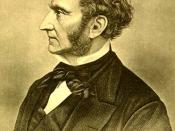John Stuart Mill suggests that a person's ethical decision-making process should be based solely upon the amount of happiness that the person can receive. Although Mill fully justifies himself, his approach lacks certain criteria for which happiness can be considered. Happiness should be judged, not only by pleasure, but by pain as well. This paper will examine Mill's position on happiness, and the reasoning behind it. Showing where there are agreements and where there are disagreements will critique the theory of Utilitarianism. By showing the problems that the theory have will reveal what should make up ethical decision-making. John Stuart Mill supports and explains his reasoning in his book, Utilitarianism. Mill illustrates the guidelines of his theory. Mill defines utilitarianism as the quest for happiness. His main point is that one should guide his or her judgements by what will give pleasure. Mill believes that a person should always seek to gain pleasure and reject pain.
Utilitarianism also states that the actions of a person should be based upon the "greatest happiness principle". This principle states that ethical actions command the greatest amount of happiness for the greatest number of people. Mill further explores the need for pleasure by noting "a being of higher faculties requires more to make him happy." . He acknowledges that some pleasures are more alluring than others are. He adds to this by making known that when placing value in things to calculate pleasure, not only quantity important but quality as well. Mill's criteria for happiness is easily understood, some statements that he gives are questionable. John Stuart Mill plainly laid out what he believes that the basis for ethical decision-making. First, the pursuit of pleasure is directly related to happiness. This idea can be easily accepted. It is natural for a person...


